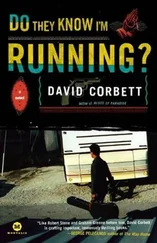Cesar cracked his eyes, which were milky from tears. He turned toward her, unsteady, grinning. “You said, ‘we.’ ”
A half hour after the rain stopped, a line of seven cars appeared and rolled slowly past the marina. Abatangelo rose onto his knees and sighted the caravan through his viewfinder. The cars sagged from the weight they carried, their suspensions creaked. The procession crept steadily across the loose muddy gravel until all seven cars lined up parallel to the windbreak wall.
The men got out, Latinos, three dozen or so. No more than six looked older than twenty, and the older ones had the yeomanly manner of hired men. They wore identical jumpsuits, like prisoners. Some wore black hooded parkas, either pulled over the jumpsuit or wrapped around the waist, sleeves knotted in front. A few of the young ones sported a hint of jewelry, a bit of personal flash. Abatangelo thought of Moreira’s press release, his promise to lift young pachucos off the street and offer them steady work.
They unloaded firearms from the car trunks in a steady, methodical hush, carrying the weapons in their arms like firewood, passing them over the wall to companions standing ankle-deep in the grassy mud. There were pump guns and bird rifles, sighted hunting carbines. Then came the serious stuff: riot guns, streetsweepers, strikers, one or two MAC-10’s for the hirelings. Ammunition boxes followed, passed hand to hand, along with cartons filled with jars of gasoline, knotted rags, cans of spray paint, the stuff of hand-to-hand street combat.
The men jumped the wall, spreading out in both directions, as the cars pulled away. One of the leaders signaled back toward the marina with his flashlight, kicking the gravel around to hide the tire tracks. Abatangelo fixed him in the telephoto lens, everything rendered vivid and immediate through the PLI. The man’s skin became the dark green of leafage; the background resembled the rippled green of pool water.
Three tottering vans appeared in the distance. They were old and rusting along the chrome lines, the wheel wells. The vans queued past the marina and, guided by the leader with the flashlight, pulled in slowly along the wall. The gunmen spaced themselves between the vans and on either end, setting up their ambush, stacking the rifles side by side along the wall, barrels up, stocks in the high wet grass. Abatangelo honed in on faces as the men loaded beehive rounds into the pump guns, deer rounds into the hunting rifles, then passed the jars of gasoline, the rags, the spray cans, up and down the line, setting them down with care. The parkas came on for shelter from the rain. Once the men were settled, one by one they removed handcrickets from their pockets and signaled down the line.
Abatangelo settled back on his haunches. Even if Shel was down there, he thought, inside one of the vans, the Mexicans had no intention of simply handing her over and being done with the matter. That much was obvious from the manpower and weaponry. They’d had their war council. Felix Randall and his men, if they bothered to appear, were low enough, hated enough, to take down without fearing much of a manhunt. Nobody at the Justice Department would so much as yawn. As for the locals, who cared? It actually made things simpler, tidier, if the Mexicans ran the meth trade. No more renegade biker romanticism, no more Aryan warrior myth. They could all join hands against the foreign menace. Blame immigration.
Abatangelo leaned forward again, returning his attention to the vans. The drivers remained in place, swallowed up in shadow, behind which firewalls separated the cabin and cargo areas. There’d be no telling if Shel was there, inside one of those vans, or even if she was alive, until they opened the doors and either brought her out or didn’t. He pulled away from the viewfinder again and massaged his eyes.
An intimation of the lunacy, the pointlessness of his being there, overwhelmed him. It combined with a gutting sense of loss. She’s dead, he thought. If they haven’t done it already, they’ll make it part of the show. And I’ll be here, he thought, peering through the viewfinder as she gets dragged from one of the vans, marched to the middle of the gravel road, given a little shove so the gunman can get a proper aim, then murdered.
Don’t do this, he told himself, shaking off the image.
He considered giving up the subterfuge, revealing himself and walking down, trying to barter for her. They’d kill him on the spot, he realized- drag his body into the grass and go back to waiting for Felix Randall’s men. A minor distraction. A little sidelight before the main event.
There’d be no saving her. Not here. As that sank in, the full weight of Shel’s death, already accomplished or imminent, bearing down, he thought to himself, “I’m sorry.” The words felt foolish, the sentiment wretched and small. If he’d simply had the courage to want her, like Wax said- the courage to comfort her when she came for help, be thankful for her being there, not connive some inane, scheming justice- she would very likely be safe and well. Frank might even be alive, he thought, or at least the blame for his death would lie elsewhere. He remembered Waxman, after the explosion, confiding he was afflicted with the image of a schoolbook drawing, Icarus in flames. What he left unremarked, of course, was the other half of the story- the vanity of Daedalus. His vanity and, in the end, his guilt.
He returned his eye to the viewfinder and photographed every grouping of shooters along the wall, as well as the drivers slouched down inside the vans. It might provide leverage later, he thought. Somebody with his face in a picture would add just a little more to the story to save himself. And if that didn’t end up keeping anyone alive, it would at least tell the tale.
A few of the men lit cigarettes, sheltered from sight by the wall but still cupping the ash glow with their hands and exhaling into the mud. A crack pipe made the rounds. One man, rocking on his haunches, fingered a cross hung from his neck by a leather thong. Two of the younger ones held hands and lowered their heads, praying. Rendered green and hazy by the PLI, the figures seemed strangely innocent through the lens, as though their images were mere projections- evil, mutinous projections- not their real selves. Their real selves remained elsewhere, asleep in bed, with their alibis.
The rain brought an acrid stench out of the ground, suggestive of petrol mixed with sewage. In the distance a short queue of tank cars pushed by a diesel tender rolled along the rail tracks inside the refinery perimeter; every man along the wall peered up, trying to see how close it was. Abatangelo braced himself against the incinerator wall for balance, hoping not to fall, betray his presence. His legs cramped. His feet had fallen asleep; his clothing, wet and cold, clung to his skin like cellophane. Using the noise of the train as cover, he pressed the shutter release and ran off seven frames, intending to catch the faces before they turned back toward the water.
The handcrickets started up again. Abatangelo caught the faint sound of motors approaching from beyond the marina.
Four new vans appeared, rolling quietly forward. The shooters along the wall grabbed their weapons, fingered the triggers and crouched, waiting for the signal to stand and fire.
The first three vans queued up as expected, but then the fourth shot past and spun back around, the bay door open. What followed defied comprehension at first, and then Abatangelo flashed on the article he’d read that morning, the weapon theft from the Port Chicago Weapons Station. A 7.6 mm chain gun. It opened fire from its mounting inside the van, targeting the Mexican vehicles at the level of the drivers’ shoulders, heavy rounds cutting through the metal, shattering the windshields and window glass. Using this as cover fire, a stream of men emptied from the three far vans, flattening themselves along the roadbed and opening fire with carbines.
Читать дальше












